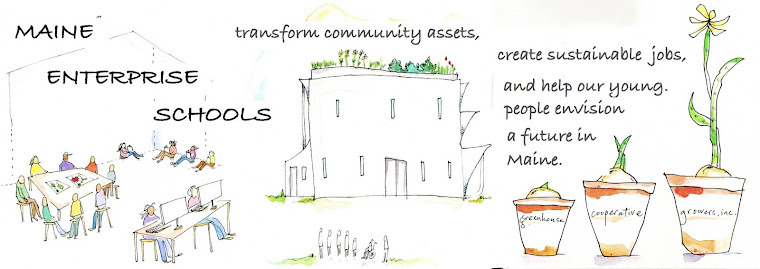Not only do we think such a thing is possible, we think it is necessary for Maine's economic, educational, and environmental survival. The model, like everything we do, rethinks some assumptions to great integrated solutions. We know, for instance, that many people have more than one passion, talent, or commitment. We also know that most people have to choose one that they make their job, relegating the others to hobby status (or worse, to "I wish I had...") status. We also know that that words leads to very inefficient, over-specialized, systems that are neither sustainable nor often terribly satisfying for those who work in them: public education, the health care and insurance industry, and social services sector are obvious examples of fields where talented people spend lots of time trying to "do good" and saying, in effect, "if only...".
So...what if you are gifted teacher of ecology and biology half-time and lover of flowers. and could sustainably raise and arranged cut-flowers for weddings and events, using your greenhouse as your classroom?
What if you are are a working artist, love collaboration and teaching, and could use health insurance? Like NYC's "studio in schools" approach, you might thrive with a modest salary, real benefits and the space, time equipment to create what you want, when you want.
What if you're at a point in your life where you can comfortably scale back, but have a real desire to work with young people and a passion for restoring old cars. You might start an auto-restoration business that employs MES students as apprenticeships, keeping the 70-car collection of one of MES' non-profit partners running for another 20 years.
What if you run a non-profit urban farming collaborative that, among other things, seeks to help recent immigrants gain and keep long-term employment? What if an MES partner in the food industry is willing to help you develop a business plan that lets your farmers grow specific crops for specific value-added food products that he can then market - bringing more Maine food to more people and helping your non-profit become revenue funded, rather than grant funded?
The four scenarios above are real possibilities suggested by potential MES enterprise partners - and also real opportunities to create the kinds of "quality of place" micro-businesses that can drive Maine's economy. Working with partners economic and community development partners like Maine Centers for Women Work and Community, MOFGA, Maine Business for Sustainability, and Maine Rural Partners, MES will help you create, finance, and implement these business plans.
Why? Because the solution to finding teachers who can work with kids who are not thriving in traditional schools in NOT (or at least not only) getting better teachers into traditional classrooms. It is in keeping the people who want to teach and can be quite good at it, but who leave because the scale is too big, the support too little, or because the kinds of compromises they have to make with the other parts of their life are too great. In short, it is making jobs that people love and want to keep, rather than jobs they tolerate until they get to retirement.
If you're interested in learning more about this, email John at jdanieri@mainefarmschool.org
